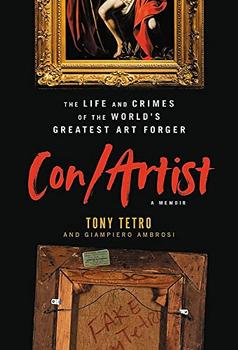Summary | Excerpt | Reviews | Beyond the Book | Readalikes | Genres & Themes | Author Bio

The Life and Crimes of the World's Greatest Art Forger
by Tony Tetro, Giampiero Ambrosi
Michelangelo was the first artist I loved solely for his art, the Sistine Chapel and the Pietà. I remember reading as a boy that Michelangelo was only twenty-two when he started working on the sculpture, laboring alone for three years. And I remember reading that Michelangelo had heard others saying that his masterpiece had been made by one of his rivals. Outraged, he sneaked into the Vatican and carved his name on the sculpture—the only artwork he ever signed. I don't blame him. It's ironic considering what I do, but years later when I forged a piece that somebody else claimed, I think I understood what Michelangelo must have felt.
But despite my interest in art, in most ways I was just an ordinary kid who liked baseball, cars, hanging around with my friends, and girls. If you had asked me what I wanted to be then, I would have told you, without a doubt, a pool hustler. As a teenager, I spent almost all of my spare time at a dark, dingy, ancient pool hall called Polly LeGrew's—which, if you didn't know any better, could have been a movie set built in the 1920s. It had six tables, a gumball machine filled with peanuts, and a couple of benches to sit on. It had only a men's restroom because no woman ever came into Polly's. The toilet was so ancient that it still had a pull chain and was manufactured by Peerless Victorious, a company that probably went out of business during the Taft administration.
Then, no respectable person spent their time in a pool hall. It was where hoods, loudmouths, gamblers, and bums hung out, but I didn't care. I loved it. I used to play for hours on end, betting kids and adults in games of Nine-Ball or straight pool. At thirteen, I was beating thirty-year-olds and pocketing ten and twenty dollars a game. If I didn't have money, people would back me and I'd split the winnings afterward. In school, I got kicked off the basketball team because I left practice to go pick up my new pool cue that had just come in.
When I was "on," I couldn't miss a shot. Once, I sank 125 balls straight. At Nine-Ball, I went six racks without missing a shot. These are the kinds of performances you'd expect from a mature adult professional. But to be a real hustler you had to have heart. Heart is when a gambler shoots the same shot whether there's a dollar on the line or a thousand. I would choke thinking more of the money than sinking the ball. If I had heart, you would have never heard of me as an art forger.
Like many of my friends, I was an altar boy. After mass we'd count donations on a big table in the back room. Some of the guys would slip a couple of fives, tens, or twenties under their robes; then we'd go play pool. I never took any money from the church; I'd just win it later playing Nine-Ball. When they got busted, I got blamed because my pockets were full of cash. It was a bitter disappointment to my mother. Stealing from the church was considered worse than being a child molester. No matter what, though, I never ratted. Ever.
In 1965, I got my girlfriend pregnant. My mother, who had a way with words, said, "You made your bed, now you're gonna sleep in it." At sixteen, I became the father of a beautiful baby girl. I got married and started working as a runner on a milk truck.
The night of my wedding, a few of us had a toast with a six-pack of beer and then I went straight to bed because I had to get up at three a.m. to make deliveries in the freezing rain. It was so cold that winter, I used to sit in the refrigerator to "warm up." Lying awake at night, I stared down the long road ahead and thought to myself, "There's no way I'm doing this for the rest of my life."
So, planning to bring Marguerite and my daughter out later, I moved to California.
Two
FULTON—WITH PALM TREES
(1969 to 1972)
When I was nine years old, my father, who owned a Lincoln-Mercury dealership, won a sales award and received an all-expenses-paid trip to the West Coast. We put on our best suits, boarded a silver propeller plane, and flew to Los Angeles. Then, LA was not considered the smoggy, crime-ridden sprawl that it is now but rather a newly minted sun-drenched and smiling city of the future, powered by the glamorous movie business, a burgeoning aerospace industry, and the promise of sunny days under swaying palm trees.
Excerpted from Con/Artist by Tony Tetro and Giampiero Ambrosi. Copyright © 2022 by Tony Tetro and Giampiero Ambrosi. Excerpted by permission of Hachette Books. All rights reserved. No part of this excerpt may be reproduced or reprinted without permission in writing from the publisher.




He who opens a door, closes a prison
Click Here to find out who said this, as well as discovering other famous literary quotes!
Your guide toexceptional books
BookBrowse seeks out and recommends the best in contemporary fiction and nonfiction—books that not only engage and entertain but also deepen our understanding of ourselves and the world around us.